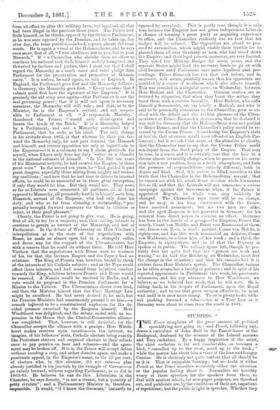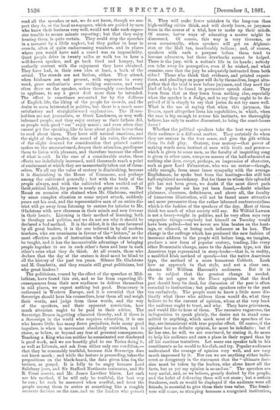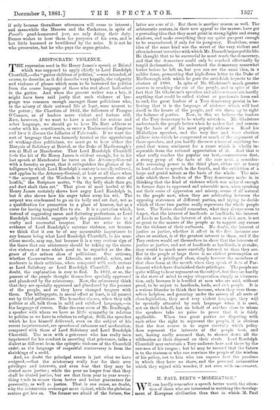STUMPING. •
THE Times complains of the great amount of political. speechifying now going on ; and Punch, following suit,.
draws a caricature of John Bull in the Parrot-house at the Zoological, deafened by the screams of the Liberal macaws, and Tory cockatoos. By a happy inspiration of the artist, the chief cockatoo is fat and comfortable, as becomes a bird, " consolled up to the crest, acred up to the beak ; " while the macaw has about him a trace of the lean and hungry Cassius. He is obviously not quite content that all should be as it is. That is enjoyable funning ; but we doubt if either Punch or the Times describes accurately either the situation or the popular feeling about it. Journalists are horribly weary of these speeches, for the speakers force them to deal with matters which, for newspaper purposes, are thresheds out, and publicists are, by the conditions of their art, impatient of repetitions ; but the public delight in speeches. Whether they read all the speeches or not, we do not know, though we sus- pect they do, or the local newspapers, which are guided by men who know their business very well, would not take such expen- sive trouble to secure minute reporting ; but that they enjoy hearing them, is quite certain. They could stop the speeches in a moment by a little neglect, but they gather to hear in crowds, often of quite embarrassing numbers, and in places where you would have said a crowd was an impossibility. Quiet people drive in twenty miles or walk ten to hear a well-known speaker, and go back tired and hungry, but perfectly content with the enjoyment they have obtained. They have had, in their own idea at least, a bath of the actual. The crowds are not listless, either. They attend, when Irishmen are not present, with eagerness to every word, grow enthusiastic over striking sentences, and very often draw on the speaker, unless thoroughly case-hardened to applause, to say a great deal more than he intended. The effect is sometimes accounted for by the dullness of English life, the liking of the people for crowds, and the desire to seem interested in politics, but there is a much more satisfactory and straightforward explanation. The House- holders are not journalists, or blase's Londoners, or very well- informed people, and they enjoy oratory as their fathers did, as people with good " ear " enjoy music ; and even when they cannot get fine speaking, like to hear about politics better than to read about them. They have still natural emotions, and the sight of the speaker, the sound of his voice, the absence of the slight demand for consideration that printed matter makes on the unaccustomed, deepen their attention, predispose them to listen with pleasure, and therefore increase the effect of what is said. In the case of a considerable orator, these effects are indefinitely increased, until thousands reach a point of excitement at which they are momentarily taken out of them- selves. We all say the value of oratory is diminishing, because it is diminishing in the House of Commons, and perhaps among the cultivated generally ; but with the body of the people always, and with the cultivated when excited out of thei critical habit, its power is nearly as great as ever. The Hous on occasion sits chained when Mr. Gladstone, excited by some complex situation or some unjust attack, suddenly pours out his soul, and the representative men of an entire dis- trict will go away from listening to orators far inferior to Mr. Gladstone with new clearness in their minds and new fervour in their hearts. Listening is their method of learning, both in theology and politics, and we do not see why it should be declared a bad method. It is the oldest, it is the one favoured by all great leaders, it is the one believed in by all modern teachers, who are unanimous in favour of the "lecture," as the most effective mode of instruction when whole classes are to be taught, and it has the inconceivable advantage of bringing people together to see in each other's faces and hear in each other's cries what they do think. At all events, those who declare that the day of the orators is dead must be blind to all the history of the past ten years. Silence Mr. Gladstone and M. Gambetta, and they remain still great politicians, but why great leaders ?
The politicians, roused by the effect of the speeches at Mid- lothian, have found this out, and so far from expecting ill- consequences from their new readiness to deliver themselves in odd places, we expect nothing but good. Democracy is enthroned in Western Europe, and it is essential that the Sovereign should hear his counsellors, hear them all and weigh their words, and judge from those words, and the way of the speakers, and their apparent conviction, how much attention ought to be paid to their advice. The Sovereign Demos is„getting educated thereby, and if there is a Sovereign in the world who requires education, it is one who knows little, has many fierce prejudices, feels many good impulses, is when in movement absolutely resistless, and is above, or below, or beyond any fear of personal consequences. Teaching a King who can neither be assassinated nor disobeyed is good work, and we are heartily glad to see Tories doing it, as well as Liberals, and ask from either only one condition,— that they be reasonably truthful, because this Sovereign does not know much ; and while the lecture is proceeding, takes the propositions on the black-board, the data given him fo% the lecture, as gospel. It is folly to be angry because Lord Salisbury jeers, and Sir Stafford Northcote insinuates, and Sir R. Cross asserts, and Mr. James Lowther blares. Let each use his method, if he will only be truthful, the best way he can ; let each be answered when needful, and trust the people among them to arrive at something like a roughly accurate decision on the case, and on the leaders who present it. They will make fewer mistakes in the long-run than high-sniffing critics think, and will slowly learn, as jurymen learn in the course of a trial, how to make up their minds. Of course, better ways of educating a master might be discovered. Of course, this way is very tiresome, or even occasionally, when speakers will get on Afghani- stan or the Malt tax, insufferably tedious ; and, Of course, speakers with such a purpose before them tend to become advocates, but those drawbacks cannot be helped. There is the jury, with a nation's life in its hands ; nobody can take away its prerogative, even if he wished, and what remains, save that the jury be adequately instructed from both sides ? Those who think that evidence, and printed exposi- tions, and pleadings on paper will do by themselves, forget alto- gether that the trial is now before jurymen, and they need the kind of help to be found in persuasive speech alone. They learn from that as they learn from nothing else, especially when the speaker is a Judge, and to say they ought to be de- prived of it is simply to say that juries do not try cases well. What is the use of saying that when this juryman, the Demos, apart altogether from his capabilities, in which, when the case is big enough to arouse his instincts, we thoroughly believe, has only to mutter discontent, to bring the court-house down ?
Whether the political speakers take the best way to move their audience is a different matter. They certainly do when they are orators in the true sense, and give the gift within them its full play. Oratory, true oratory—that power of making words seem instinct at once with truth and power— which is given to some men, as the faculty of inspiriting song is given to other men, conquers masses of the half-educated as nothing else does, except, perhaps, an impression of character, such as gave Lord Palmerston, who was no orator—though, oddly enough, from some inner sympathy with the average Englishman, he spoke best from the hustings—his still but half-explained ascendancy. But for those to whom this splendid gift has not been given, we doubt if the most direct path to the popular ear has yet been found,—doubt whether plainness, clearness, definiteness, and above all, the faculty of humorous illustration, will not be found more attractive and more persuasive than the rather laboured controversialism which is the fashion of the speakers of the day. Most of them think too much of what society will say. Sir Wilfrid Lawson is not a heavy-weight in politics, and he very often says very unpopular things—anybody but himself on Tuesday would have been pelted—but we never see him beaten on the hust- ings, or silenced, or losing such influence as he has. The change in the suffrage which has produced the new fashion of incessant address to the people will before long, we imagine, produce a new form of popular oratory, tending, like every other Democratic change, more to the American type, not the American type represented in story-books—that is, in reality, a modified Irish method of speech—but the native American type, the method of a more humorous Cobbett. Look how an approach to that style, and not a close one, charms Sir William Harcourt's audiences. But it is as to subject that the greatest change is needed. We do not agree in the Times opinion that the dead past should bury its dead, for discussion of the past is often essential to instruction; but public speakers refer to the past too exclusively. The people want to know a little more dis- tinctly what those who address them would do, what they believe to be the current of opinion, whom at the very least the audience ought to trust, and why. They have grievances, and would like to-hear of them. The excessive vagueness, the indisposition to speak plainly, the desire not to stand com- mitted to anything, which mark most of the speeches of to- day, are inconsistent with true popular effect. Of course, if the speaker has no definite opinion, he must be indefinite ; but if he has one, he will, we are convinced, by stating it, do more to help his audience and earn a place in their regard than by all his cautious tentatives. Let some one speaker talk to his constituents as he would to his club, and try. Popular audiences understand the courage of opinion very well, and are very much impressed by it. Nor can we see anything either indis- creet or derogatory in the statement that the "ultimate deci- sion must be taken by the leaders, who alone know all the facts, but as yet my opinion is so-and-so." The speeches are very useful, and, as we believe, greatly desired by the people, and the habit of delivering them will not cease ; but a certain frankness, such as would be displayed if the audience were all friends, is essential to give them their true value. The-frank- ness will come, as stumping becomes a recognised institution, if only because threadbare utterances will cease to interest; and meanwhile the Macaws and the Cockatoos, in spite of Punch's good-humoured jeer, are only doing their duty. Demos wishes to hear them for purposes of his own, and is but little harassed or bewildered by the noise. It is not he who prosecutes, but he who pays the organ-grinder.








































 Previous page
Previous page